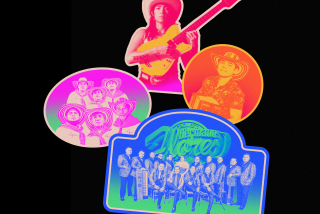MUSIC REVIEW : Zukerman, Romero: An Odd Bowl Mix
- Share via
Wednesday night at the Hollywood Bowl was all chamber-scale calm after the season-opening salvo of Beethoven’s Ninth. Maybe it was too calm--too intimate, too stylistically diffuse--especially for the great outdoors.
The twin performance of guitarist Angel Romero and flutist Eugenia Zukerman, who was filling in for an ailing Jean-Pierre Rampal, amounted to a whole that was less than the sum of its parts. Despite moments of glory and reliable pleasures, it was one of those nights when things never quite took off.
A smallish crowd of 6,768 responded frequently, flinging applause at every silence: between movements and even into mere pregnant pauses.
Romero is a player of great refinement and elan, qualities detectable even through a tone-compromising microphone and with a sonic undercoat of freeway white noise. He unveiled a sampler of Spanish works, including Tarrega’s timeless “Recuerdos de la Alhambra” and Enrique Granados’ “Danza Espan~ola”--a thing of tender beauty--as well as the less well-known “Triptico,” a work of flamenco-tinged bravado by Romero’s father, Celedonio.
Next up, the flute. Zukerman, joined by pianist John Steele Ritter, switched cultural and textural gears to tender her considerable skills on Poulenc’s Sonata for Flute and Piano. Flutist Anne Diener Giles twittered ably on Francois Bourne’s “Fantasie Brilliante” on themes from Bizet’s “Carmen,” and both flutists slalomed through Franz Doppler’s showpiece Andante and Rondo for Two Flutes and Piano, Opus 25.
After intermission, Zukerman and Ritter were joined by bassist Charles Berghofer and drummer Ralph Humphries for six movements of Claude Bolling’s Suite No. 1 for Flute and Jazz Piano, one of those attempts at the perilous merger of jazz and classical sensibilities--both in terms of content and execution. A quaint novelty item by now, it fails to register in either genre, settling too often in a bland middle zone of pop puffery.
To close, at last the programming made sense, as Romero and Zukerman offered a world premiere of Celedonio Romero’s “Poema Andaluz.” This blithe-spirited, folk-themed piece saved the concert from its own restless agenda.
More to Read
The biggest entertainment stories
Get our big stories about Hollywood, film, television, music, arts, culture and more right in your inbox as soon as they publish.
You may occasionally receive promotional content from the Los Angeles Times.










